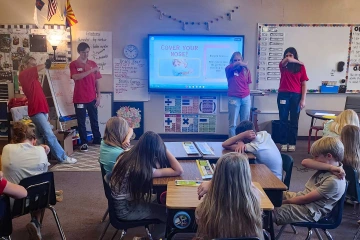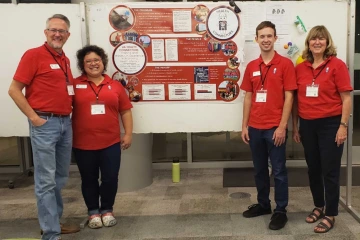Improving health literacy through leadership, connection
The University of Arizona Health Sciences K-12 Health Literacy Project builds leaders and boosts health literacy by training students to teach kids about health topics.

Lauren Taylor and Matthew Racine, who were part of the Health Connectors program in spring 2024, returned as Super Connectors in fall 2024 to mentor new students joining the program.
Photo by Kris Hanning, U of A Health Sciences Office of Communications
Lauren Taylor still remembers the day her dad tied dental floss around her loose tooth, looped it to a doorknob and slammed the door shut. It was a little traumatic – but it worked. A saltwater rinse followed, and the experience left a lasting impression.

In spring 2024, Lauren Taylor (far right) and Matthew Racine (second from left) were part of a Health Connectors group that visited a third-grade classroom to teach kids about seasonal allergies.
Photo courtesy of Amber Price
Years later, as an undergraduate student at the University of Arizona, Taylor stood in front of an elementary school class, helping kids floss a modeling compound out of egg cartons. Taylor’s childhood memory came full circle, as she was now teaching a lesson on dental hygiene through the U of A Health Sciences’ K-12 Health Literacy Project.
“I’ve never forgotten that moment with my dad, and now I’m helping kids understand why taking care of their teeth matters,” said Taylor, who is pursuing bachelor’s degrees in care, health and society at the U of A College of Social and Behavioral Sciences and public health at the U of A Mel and Enid Zuckerman College of Public Health.
Building health literacy, one lesson at a time
The Health Connectors Internship program is part of the K-12 Health Literacy Project, a U of A Health Sciences effort to enhance science and health literacy in children and young adults.
The Centers for Disease Control and Prevention defines health literacy as the degree to which individuals can find, understand and use information and services to inform health-related decisions and actions for themselves and others. According to research published in the International Collegiate Journal of Science, only 12% of the U.S. population is properly health literate to efficiently navigate the health care system.
The Health Connectors program tackles this challenge head-on by training future health care professionals and inspiring children to become interested in health and well-being.
“It’s the only program of its kind in our state focused on talking to younger people so they grow into healthier adults,” said Amber Price, MSN-Ed, RN, a U of A College of Nursing lecturer who is the director for the K-8 Health Connections Program and primary instructor for Health Connectors Internship “Our students practice explaining health to kids, and it changes how they see their careers.”

Soleil LaSalle, a Health Connector student, refines her health literacy presentation with instructor feedback from Cindy Rankin, PhD, Amber Price, RN, and Kevin Kehl.
Photo by Kris Hanning, U of A Health Sciences Office of Communications
U of A students are trained to explain health topics – from asthma to allergies and dental health to hygiene – in ways kids and teenagers can understand. At the same time, the college students, dubbed Health Connectors, gain valuable communication and leadership skills they can carry with them into health careers.
The semester-long course, Nursing 493, is offered as a three-unit independent study. The syllabus includes interactive lectures on child development, family context and effective communication. Price says 86 students have taken the course since it was first offered in 2023.
“The goal is for students to connect personal experiences to the science they’re learning,” Price said. “We want them to relate to kids by reflecting on their own childhoods, helping them see how these health concepts impact everyone’s lives.”
Students who enroll in the course work in small groups of four to six that blend multidisciplinary majors such as physiology, public health and molecular biology. Each group is assigned a K-8 school and a health topic. The students dive into research and produce a detailed lesson plan and a 45-minute presentation. Each presentation includes slides, a hands-on activity and a take-home tool for kids to reteach their families.
Health Connector students practice the lesson twice in front of their instructors and peers before taking it to the K-8 classroom. The experience ends with a Q&A.
“The practice of teaching these lessons changes how the students view their own communication skills,” Price said. “They move from being nervous about public speaking to feeling confident in their ability to explain important concepts.”
From learning to leading
During the spring 2024 semester, the Health Connectors program debuted a unique leadership opportunity for U of A students who previously completed the program and wished to continue their involvement in the internship. These students, known as Super Connectors, returned to mentor new Health Connectors, sharing their experience, knowledge and advice.
Price said the Super Connector role provides benefits for both the new students and the mentors. New Health Connectors gain valuable support from experienced peers, while Super Connectors deepen their understanding of the program by viewing it from a different perspective. The Super Connectors’ leadership experience builds confidence, a crucial soft skill for future health professionals.
In the fall 2024 semester, Taylor and Matthew Racine were Super Connectors in Price’s class. The two met when they were in the same Health Connectors group the previous semester.

(From left) Kehl, Price, Racine and Rankin presented a poster on the Health Connectors program at the 17th Arizona Physiologic Society annual meeting in fall 2024.
Photo courtesy of Amber Price
For Taylor, one of the best experiences as a Super Connector was getting to teach a segment of her own choosing to the Health Connectors. As a certified youth and adult mental health first aid provider, Taylor chose to present on the topic of mental health and its importance for aspiring health care professionals. She emphasized the universal importance of mental health in all health care fields, advocating for its inclusion in their curriculum.
Meanwhile, Racine became a trailblazer as the first graduate student to return to the program. He graduated from the U of A College of Medicine – Tucson in 2024 with a bachelor’s degree in physiology and medical sciences and is pursuing a master’s in Clinical Translational Sciences at the U of A College of Health Sciences. His long-term goal is to attend medical school to become a physician.
“Through the Health Connectors internship, I learned how to break down complex ideas for kids who don’t know big science words. As a Super Connector, I was able to take on more of a mentorship role,” Racine said. “Those are skills I’ll use every day as a surgeon.”
Price believes Racine’s involvement as a graduate student benefits the entire program.
“Graduate students like Matthew bring a deeper perspective and maturity that elevate the program,” Price said. “They’ve already got research and teaching experience, so they model leadership and precision for undergrads while refining their own skills.”
As Health Connectors and then Super Connectors, Taylor and Racine developed skills for their futures. Beyond that, they personified the idea that health care begins with connection, linking college students and young learners in a shared journey toward healthier lives.
Experts
Cindy Rankin, PhD
Associate Professor, Department of Physiology, U of A College of Medicine – Tucson
Executive Director, K-12 Health Literacy Project, U of A Health Sciences
Amber Price, MSN-Ed, RN
Lecturer, U of A College of Nursing
Director, K-8 Health Connections Program, U of A Health Sciences
Kevin Kehl
Senior Program Manager, K-12 Health Literacy Project, U of A Health Sciences
Related Stories
Contact
Blair Willis
U of A Health Sciences Office of Communications
520-419-2979, bmw23@arizona.edu

